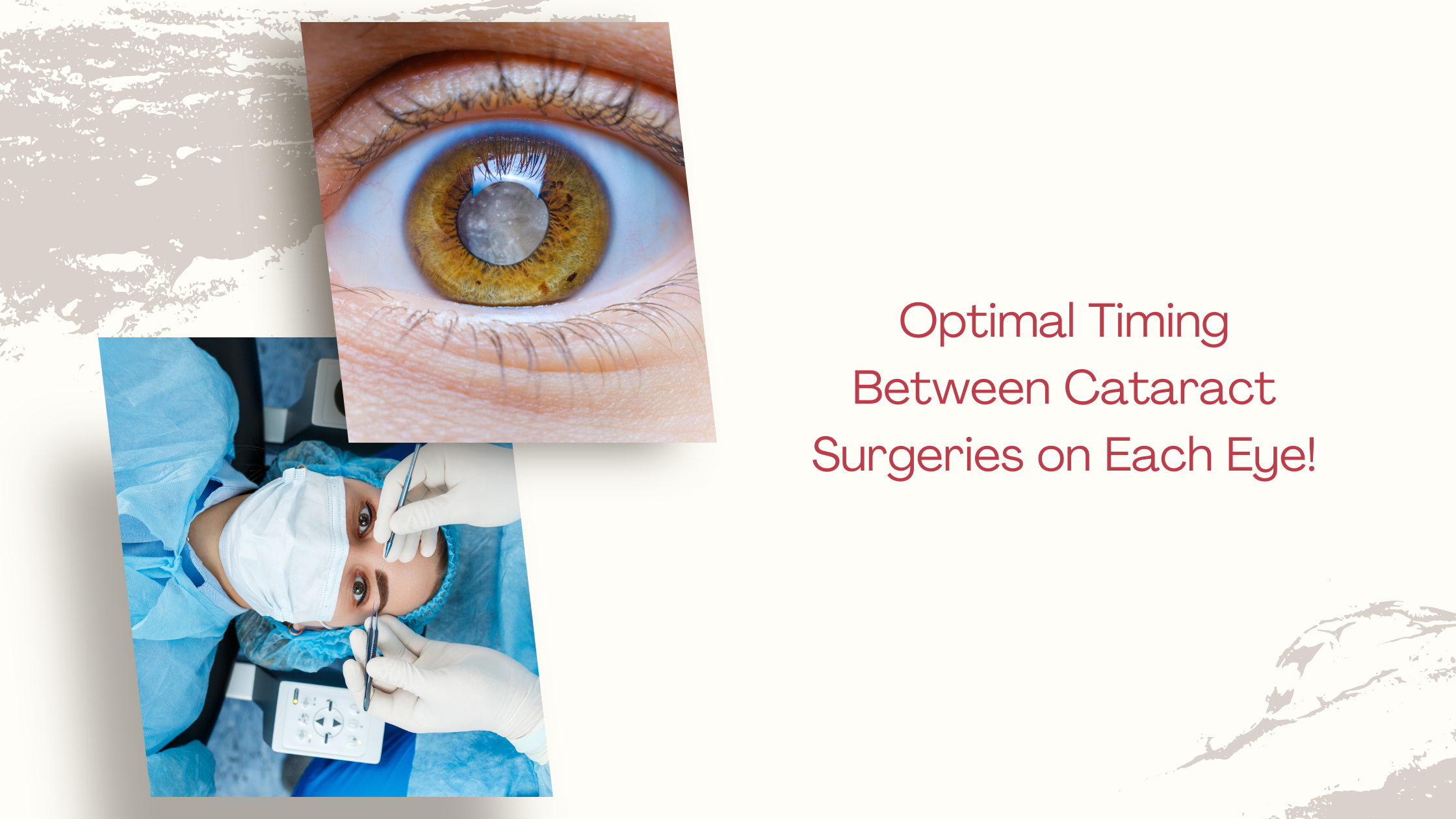Are you ready to see the world through clearer lenses? If you or a loved one is dealing with cataracts, you know how they can blur your vision and make everyday tasks difficult. Fortunately, Cataract Surgery in Mumbai offers a reliable solution to regain your sight and enhance your overall quality of life. However, one critical question patients often ask is: “How long should I wait between cataract surgeries on each eye?”
Let’s dive into this topic and understand the ideal timing for these procedures, and why it’s crucial for a smooth and successful recovery.
What Are Cataracts?
Cataracts are a condition where the eye’s natural lens becomes cloudy, resulting in blurred vision, sensitivity to light, and difficulty in performing day-to-day activities. Cataract surgery is the only permanent solution, and with advancements in medical technology, the procedure is now minimally invasive, safe, and highly effective.
At Clear Vision Eye Clinic in Mumbai, we provide cutting-edge cataract treatment, including surgeries without stitches, injections, or eye patches. With technologies such as foldable intraocular lens implants (IOLs) and multifocal IOLs, cataract surgery has become a life-changing solution for millions of patients globally. But what about undergoing surgery on both eyes? Should you do them together or wait?
Why Timing Matters Between Cataract Surgeries
When a patient has cataracts in both eyes, it’s not uncommon for them to wonder if they can get both surgeries done at the same time. However, the common practice is to operate on one eye first, allowing it to heal before proceeding with surgery on the second eye. This approach not only helps balance the visual outcome but also reduces the risk of complications.
The ideal waiting period between cataract surgeries is typically 1 to 2 weeks, though it may vary based on the individual’s health, the complexity of the case, and the surgeon’s recommendation.
Factors to Consider
Several factors influence the timing between surgeries:
- Healing Process: After the first surgery, your eye needs time to heal. The initial week is critical for recovery, and undergoing a second procedure too soon can increase the risk of complications.
- Vision Adjustment: Performing surgery on one eye at a time allows your brain to adjust to the improved vision. This is important for avoiding discomfort caused by the imbalance in vision between the two eyes.
- Patient Comfort: Some patients prefer a quick recovery and want both surgeries done in rapid succession. Others may feel more comfortable taking their time, especially if they want to evaluate the outcome of the first surgery before proceeding with the second.
Shorter Waiting Period: Is It Beneficial?
For most patients, waiting about 1 to 2 weeks between cataract surgeries is recommended. This short gap offers several advantages:
– Faster Visual Rehabilitation: Addressing both eyes within a short timeframe minimizes disruption to daily life. Patients can experience improved vision in both eyes sooner, which aids in overall recovery and visual balance.
– Balanced Outcome: By allowing a brief healing period, surgeons can assess the outcome of the first surgery and apply any necessary adjustments for the second procedure. This ensures that both eyes achieve optimal visual clarity.
– Informed Experience: After the first surgery, patients can better understand what to expect during the second procedure. This familiarity reduces anxiety and makes the overall experience smoother.
Longer Waiting Period: When Is It Necessary?
While most patients benefit from a short gap between surgeries, some situations may warrant a longer waiting period:
- Underlying Health Conditions: Patients with certain health conditions such as diabetes or glaucoma may require a longer recovery period to ensure safe and effective healing.
- Surgical Complications: In rare cases, if complications arise during or after the first surgery, your surgeon may recommend delaying the second surgery to focus on full recovery.
- Personal Preferences: Some individuals might prefer to delay their second surgery to feel fully confident in the results of the first procedure. This can be especially common if there’s anxiety about undergoing a second operation too quickly.
Role of Personalized Care
At Clear Vision Clinic, we emphasize personalized care. Each patient’s situation is unique, and our highly skilled team of best cataract surgeons in Mumbai takes time to evaluate your specific needs. We work closely with you to create a customized surgical plan, ensuring the timing between procedures suits your health, lifestyle, and vision goals.
With years of experience and state-of-the-art equipment, our specialists, led by Dr. Vinay K. Agrawal, have successfully guided countless patients through their cataract treatment in Mumbai. Whether it’s offering pre-surgery advice or post-surgery care, we are committed to providing the highest standard of service at every stage.
Preparing for Cataract Surgery
Proper preparation before surgery is crucial for a smooth procedure and quick recovery. This includes:
– Pre-Operative Evaluations: A thorough eye examination is essential to determine the severity of the cataracts and ensure that you are in good overall health for surgery.
– Medication Management: Some patients may need to temporarily adjust or stop taking certain medications to reduce the risk of bleeding or other complications during surgery.
– Lifestyle Adjustments: Make arrangements for post-surgery recovery, such as having someone to drive you home and assist with daily activities for the first few days.
Post-Surgery Care: The Key to Success
Post-operative care is equally important in achieving the best results from your cataract surgery. Here are some tips to ensure smooth healing:
- Follow-Up Appointments: These are crucial for monitoring the healing process and addressing any early signs of complications.
- Eye Drops: Use prescribed eye drops diligently to prevent infection, control inflammation, and promote healing.
- Avoid Strain: In the first week, avoid heavy lifting, bending over, or engaging in activities that could strain your eyes.
- Sunglasses: Wear sunglasses to protect your eyes from bright lights, which can be particularly bothersome right after surgery.
Advanced Cataract Treatment at Clear Vision Eye Centre
At Clear Vision Eye Clinic in Mumbai, we offer some of the most advanced cataract operations in Mumbai. Using the latest technology, such as multifocal IOLs and laser-assisted surgery, we deliver exceptional outcomes with minimal downtime. Our procedures are designed to eliminate the need for stitches or patches, ensuring you can resume your daily life quickly and comfortably.
Whether you’re seeking advice from the best cataract eye specialist in Mumbai or ready to schedule your surgery, our team is here to guide you every step of the way. We prioritize patient comfort and deliver personalized care, ensuring that each individual’s journey toward clearer vision is as smooth and successful as possible.
Conclusion: Taking the First Step to Clearer Vision
Deciding on the optimal timing between cataract surgeries is a personal choice that should be made in consultation with your best cataract surgeon in Mumbai. At Clear Vision Eye Centre, we aim to make this journey easier by offering world-class cataract surgery solutions tailored to your needs.
With a focus on quick recovery, patient comfort, and long-term results, we are committed to restoring your vision with minimal downtime. So, if you’re considering cataract surgery in Mumbai, don’t hesitate to reach out. Your journey to clearer, brighter vision starts here.




